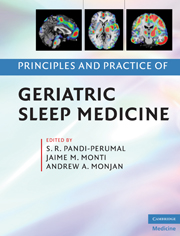Book contents
- Principles and Practice of Geriatric Sleep Medicine
- Principles and Practice of Geriatric Sleep Medicine
- Copyright page
- Dedication
- Contents
- Contributors
- Foreword
- Preface
- Credits and acknowledgments
- Organization of the first edition
- About the editors
- Part 1 Sleep and normal aging
- 1 Aging and circadian rhythms: general trends
- 2 Possible mechanisms and consequences of age-related changes in the middle years of life
- 3 Sleep throughout the menopausal transition and post-menopause
- 4 Neuropsychology and neuroimaging of sleep-dependent memory processing: implications for aging
- 5 Sleep and memory in the elderly
- 6 Sleep and autonomic dysregulation in the elderly
- 7 Age-related changes in the pharyngeal structure and function in sleep apnea and normal subjects
- Part 2 Neuroendocrine and homeostatic changes in the elderly
- Part 3 Sleepdisorders in the elderly
- Part 4 Treatment of sleep disorders in the elderly
- Index
2 - Possible mechanisms and consequences of age-related changes in the middle years of life
from Part 1 - Sleep and normal aging
Published online by Cambridge University Press: 04 August 2010
- Principles and Practice of Geriatric Sleep Medicine
- Principles and Practice of Geriatric Sleep Medicine
- Copyright page
- Dedication
- Contents
- Contributors
- Foreword
- Preface
- Credits and acknowledgments
- Organization of the first edition
- About the editors
- Part 1 Sleep and normal aging
- 1 Aging and circadian rhythms: general trends
- 2 Possible mechanisms and consequences of age-related changes in the middle years of life
- 3 Sleep throughout the menopausal transition and post-menopause
- 4 Neuropsychology and neuroimaging of sleep-dependent memory processing: implications for aging
- 5 Sleep and memory in the elderly
- 6 Sleep and autonomic dysregulation in the elderly
- 7 Age-related changes in the pharyngeal structure and function in sleep apnea and normal subjects
- Part 2 Neuroendocrine and homeostatic changes in the elderly
- Part 3 Sleepdisorders in the elderly
- Part 4 Treatment of sleep disorders in the elderly
- Index
Summary
- Type
- Chapter
- Information
- Principles and Practice of Geriatric Sleep Medicine , pp. 22 - 32Publisher: Cambridge University PressPrint publication year: 2009
- 2
- Cited by



